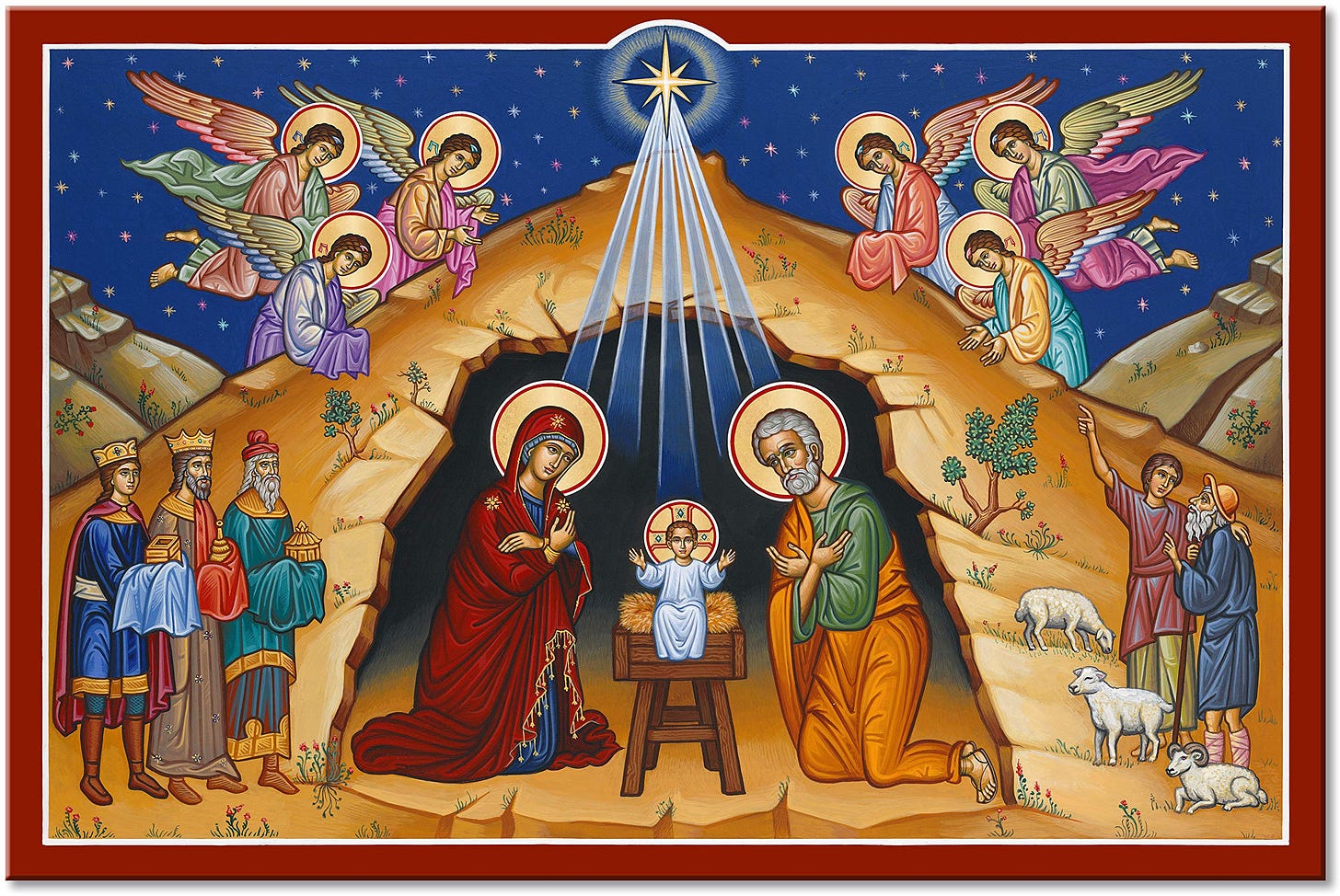A homily from the Service of Lessons and Carols at Walker Chapel on December 15, 2024
John 1:1-5
Dawn told me that traditionally, the pastor of Walker Chapel has read the ninth reading each year during Lessons & Carols. I think I know why the pastor is tasked with this reading. You see, John’s prologue does not fit within the framework of what we expect from our gospels this time of year. Somehow, John’s prologue is to fit into the same genre of writing as the Nativity stories told by Matthew, Mark, and Luke. Their accounts are much different from John’s. Their accounts are more familiar to us.
Matthew and Luke are cute. They make for a lovely children’s pageant, and the Christmas cards practically write themselves. Matthew and Luke’s accounts include the incarnation, the Light of God, entering into our world in the most vulnerable of ways, and yet at the same time, they are full of darkness, which perhaps is why we are more familiar with their accounts are more familiar. We are more comfortable with the darkness that accompanied the incarnation than the Light, which made it possible.
Darkness is something each of us must deal with in our own way. Taking a literal approach to darkness, we all must figure out how to navigate unfamiliar sidewalks and streets when we are out after the sun has set.

We all must account for how shadows dance off the ceiling in the middle of the night. Since I had children, I have learned that the journey from the bedroom to the bathroom in the dark of night is treacherous, never knowing what hazard my son has left on the floor for me (lately, it has been Legos). In one way or another, the darkness we experience as we move through the day must be dealt with because since God created the Heavens and the Earth, there has been day and night.
Another form of darkness we are experiencing today is the same darkness that Matthew, Mark, and Luke write about in their accounts of Christ entering the world. Each of their Nativity stories and the stories that followed darkness was present:
(darkness because of) The sound of boots stomping down the dusty roads,
(darkness because of) the sound of doors being knocked on and kicked down,
(darkness because of) the scraping sound of metal on metal as swords are unsheathed,
(darkness because of) the chaotic sounds of orders being shouted,
(darkness as) fathers shoved aside,
(darkness as) mothers (are) gasping,
(darkness as) babies (are) being taken.
That is the darkness we are familiar with. We are more familiar, unfortunately, with the darkness than the Light John is using as a contrast. We are more familiar with the darkness because of the sound of refugees walking on a dirt road, seeking safety in a new land. We are more familiar with the darkness of doors being knocked down as search warrants are being served in the dead of night to people who are misidentified as perpetrators of crime because they fit a mold. We are more familiar with the darkness because we hear the sounds of war echoing on our televisions as we sit in the comfort of our own homes. We are more familiar with the darkness as we hear bigotry and hatred shouted on a tiki-torch-lit night. And we are more familiar with the darkness as we see fathers pushed aside and mothers gasping as they are separated from their children when they arrive in the nation where they thought they would find sanctuary.
My friends, we are more familiar with the darkness, which is why I suspect the Nativity stories of Matthew and Luke are read only once a year.
Looking at John’s prologue’s beginning again, we find a crucial detail. A detail that is overlooked by our excitement over the light: “The light shines in the darkness, and the darkness did not overcome it.” Did you miss it?
The darkness did not overcome the light.
The incarnation reveals that while the darkness may seem dark, the Light of Christ always prevails. The Magi did not allow Herod’s darkness to overcome the Light revealed to them in an infant. When Mary and Joseph fled to Egypt, they did not allow the darkness of what was happening in their homeland to prevent them from returning home again. God has seen to it that the divine Light present at creation will be present in the darkness we experience. Since the beginning, our Creator has been in the business of casting out the darkness swirling in the chaos of the cosmos.
In the darkness we experience today, a worldwide refugee crisis, a criminal justice system in desperate need of reform, wars that seem to have been accepted as the status quo without an end in sight, bigotry, and hatred that has percolated out of the holes it had been hiding in, and children who still have not been reunited with parents, in these situations, it easy to allow the darkness to adjust our vision so that we miss what John told us from the very beginning, “The light shines in the darkness, and the darkness did not overcome it.” In the darkness, each of us experiences the grace of our Lord, and Savior is present. The Light will not give way to darkness.




